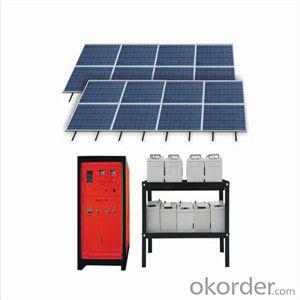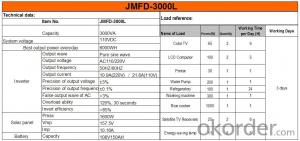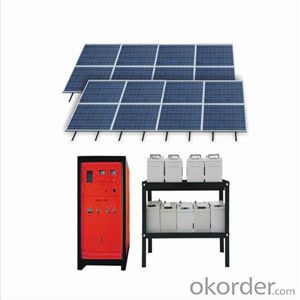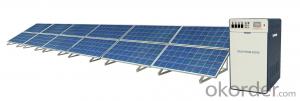Solar Energy Systems Scottsdale - Household Solar Power System JMFD-3000L
- Loading Port:
- Shanghai
- Payment Terms:
- TT OR LC
- Min Order Qty:
- 10 pc
- Supply Capability:
- 10000 pc/month
OKorder Service Pledge
OKorder Financial Service
You Might Also Like
Depending on the technical strength of Chinese Academy of Sciences, with advanced production equipments and high-quality imported electrical components, we successfully develop and manufacture two series products:
1. Solar Photovoltaic Power Station, Solar Street Lights, Solar Landscape Lights, Solar Garden Lights, Solar Lawn Lights etc.
2. Integrated Intelligent LED Power Supply, LED Street Lights, LED Tunnel Lights, LED Floodlights, LED Highbay Lights, LED Commercial, Home lightings etc.
Meanwhile, we optimize the combination of solar energy and LED lighting perfectly.Over the last few years; practice, it proves that solar street lights manufactured by Coursertech has been able to reach 365 days normal lighting out of climate impact, light decline rate of LED lightings controlled within 8% after using 30000 hours, conversion efficiency reach more than 92%, power factor reach 0.97. LED street light reflector designed by Coursertech, could increase efficiency 30% higher, has got national invention patent!
- Q: Can solar energy systems be used in powering data centers?
- Yes, solar energy systems can be used to power data centers. Solar panels can be installed on the rooftops or in nearby areas to generate electricity from sunlight, which can then be used to power the data center's operations. This renewable energy source not only reduces reliance on fossil fuels but also helps in reducing carbon emissions, making it an environmentally friendly option for powering data centers.
- Q: Is it possible to store excess solar energy for later use?
- Yes, it is possible to store excess solar energy for later use. This can be done through various methods such as using batteries, pumped hydro storage, or converting the energy into hydrogen or other forms of fuel for later use.
- Q: Can solar energy systems be used in areas with limited access to solar energy permits and approvals?
- Yes, solar energy systems can still be used in areas with limited access to solar energy permits and approvals. In such cases, off-grid solar systems can be installed, allowing individuals or communities to generate and use solar energy without relying on local utility permits. These systems typically involve smaller-scale installations and can be a viable option for areas with limited access to solar energy permits and approvals.
- Q: How do solar energy systems impact energy independence in rural areas?
- Solar energy systems have a significant impact on energy independence in rural areas. By harnessing the power of the sun, these systems provide a reliable and renewable source of electricity, reducing the dependence on traditional fossil fuel-based energy sources. This not only helps to reduce energy costs for rural households and businesses but also empowers them to generate their own electricity and become less reliant on the grid. Solar energy systems thus play a crucial role in promoting energy independence and sustainability in rural areas.
- Q: Can solar energy systems be used for powering off-grid wildlife monitoring stations?
- Yes, solar energy systems can be used for powering off-grid wildlife monitoring stations. Solar panels can capture sunlight and convert it into electricity, which can then be stored in batteries for use during the night or cloudy days. This makes it a reliable and sustainable source of power for remote wildlife monitoring stations that are located far away from the grid. Additionally, solar energy systems are cost-effective and environmentally friendly, making them an ideal choice for powering off-grid wildlife monitoring stations.
- Q: What are the benefits of using solar energy systems?
- There are several benefits of using solar energy systems. Firstly, solar energy is a renewable source of energy, meaning it will never run out as long as the sun exists. This makes it a sustainable and environmentally friendly alternative to fossil fuels. Secondly, solar energy systems produce clean electricity, emitting zero greenhouse gases and reducing air pollution. This helps combat climate change and improves air quality, leading to better public health. Additionally, solar energy can save homeowners and businesses money on their electricity bills, as they can generate their own power and reduce reliance on the grid. Lastly, solar energy systems create job opportunities in the renewable energy sector, contributing to economic growth and development.
- Q: Can solar energy systems be used in areas prone to hurricanes or typhoons?
- Yes, solar energy systems can be used in areas prone to hurricanes or typhoons. While it is true that severe weather events like hurricanes and typhoons can pose a risk to solar panels, modern solar energy systems are designed to withstand such conditions. Solar panels are typically built to withstand high winds and hail, and they are tested and certified to meet certain wind resistance standards. The panels are securely mounted and anchored to roofs or the ground to prevent them from being lifted or blown away during strong winds. Additionally, manufacturers often conduct tests to ensure that their panels can withstand extreme conditions, including those experienced during hurricanes or typhoons. In areas prone to hurricanes or typhoons, it is also common to have building codes and regulations that require solar installations to meet specific wind load requirements. These requirements ensure that the solar energy systems can withstand the strong winds associated with these storms. Furthermore, inverters and other components of solar energy systems are often installed in protected areas, such as basements or garages, to minimize the risk of damage from flooding or flying debris. Stringent installation practices, including reinforced mounting systems and proper grounding, can further enhance the durability and resilience of solar energy systems in hurricane or typhoon-prone areas. It is important to note that while solar energy systems can withstand severe weather events to a certain extent, there is always a risk of damage during extremely powerful hurricanes or typhoons. However, this risk is not unique to solar energy systems and applies to other infrastructure as well. Proper design, installation, and adherence to local building codes can help minimize this risk and ensure the safe and reliable operation of solar energy systems in hurricane or typhoon-prone areas.
- Q: Can solar energy systems be used in areas with limited sunlight?
- Yes, solar energy systems can still be used in areas with limited sunlight. While solar panels may not generate as much electricity as they would in sunnier regions, they can still produce a significant amount of energy. Additionally, advancements in solar technology, such as the use of more efficient panels and energy storage solutions, have made it possible to harness solar power even in areas with less sunlight.
- Q: What are the different incentives available for installing solar energy systems?
- There are several incentives available for installing solar energy systems, which can make this renewable energy source more financially feasible for homeowners and businesses. One of the most common incentives is the federal investment tax credit (ITC). The ITC allows individuals or businesses to deduct a percentage of the cost of installing a solar system from their federal taxes. Currently, the ITC offers a 26% tax credit for residential systems and commercial systems installed before the end of 2022. Another incentive is net metering, which allows solar system owners to receive credit for the excess electricity their system generates and feeds back into the grid. With net metering, homeowners can offset their electricity bills by using these credits during times when their solar panels do not produce enough energy, such as at night or during cloudy days. Many states also offer additional incentives, such as grants, rebates, or performance-based incentives, to further encourage the adoption of solar energy systems. These incentives vary by state but can significantly reduce the upfront costs of installing solar panels. Some utility companies also provide incentives through solar renewable energy certificates (SRECs). SRECs are tradable credits that represent the environmental attributes of a certain amount of electricity generated from solar energy. By generating solar electricity, homeowners or businesses can earn these SRECs and sell them to utilities, providing an additional source of income. Lastly, some local governments offer property tax exemptions or deductions for installing solar energy systems. This means that the added value of the solar system to a property is not subject to increased property taxes, making solar installations financially more attractive. All of these incentives help offset the initial investment and ongoing costs of solar energy systems, making them a more viable and affordable option for those interested in adopting renewable energy and reducing their carbon footprint.
- Q: How do solar energy systems affect water conservation?
- Solar energy systems can have a positive impact on water conservation by reducing the need for water-intensive conventional power generation methods. Unlike fossil fuel power plants that rely on large amounts of water for cooling, solar energy systems do not require water for operation. This helps to preserve and conserve water resources, especially in areas facing water scarcity or drought conditions. Additionally, solar energy systems can be used to power water pumps and purification systems, further promoting sustainable water management practices.
Send your message to us
Solar Energy Systems Scottsdale - Household Solar Power System JMFD-3000L
- Loading Port:
- Shanghai
- Payment Terms:
- TT OR LC
- Min Order Qty:
- 10 pc
- Supply Capability:
- 10000 pc/month
OKorder Service Pledge
OKorder Financial Service
Similar products
Hot products
Hot Searches
Related keywords





















